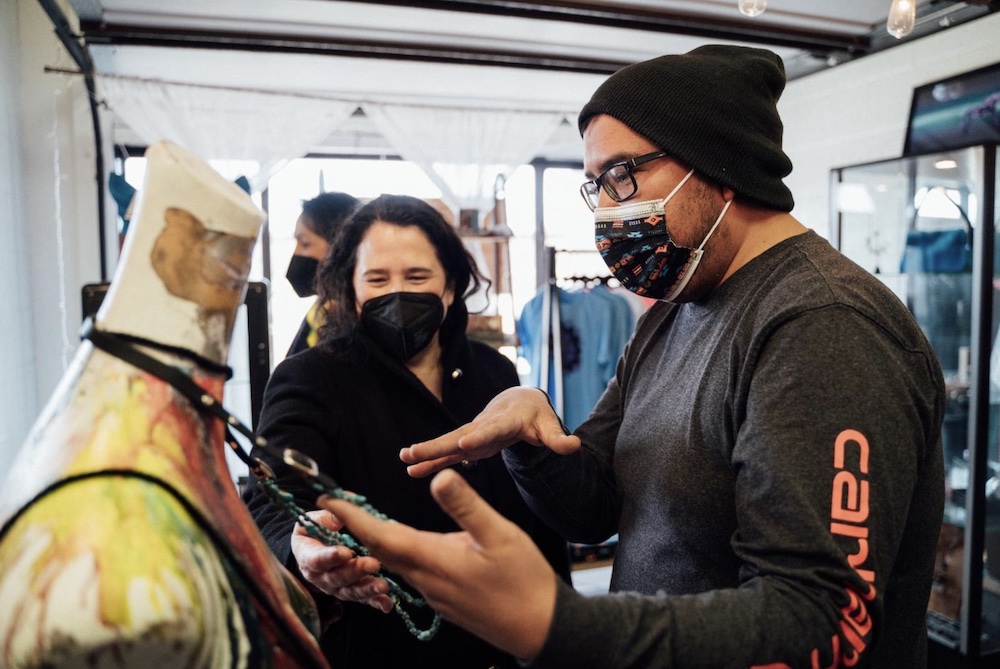
- Details
- By Jackson S. Brossy and Mark Madrid, US Small Business Administration
- Opinion | Op-Ed
Guest Opinion. Native people are rightly skeptical when it comes to federal programs that purport to help them. The Community Navigator Pilot Program, authorized by the American Rescue Plan, seems to have defied this trend, offering tangible benefits, meaningful training, and crucial support to Native communities, including facilitating millions of dollars in financing for small Native American-owned businesses.
As this transformative pilot program nears its conclusion, it's paramount to recognize the contributions of the Native-led and Native-serving organizations that administered it and to honor the perseverance of Native entrepreneurs dedicated to uplifting their families and communities.
The COVID-19 pandemic laid bare the deep healthcare and financial disparities across America, disproportionately impacting marginalized communities, particularly Native American populations. The devastating toll was painfully evident for all 574 Tribes and Indigenous communities that endured staggering infection and mortality rates, highlighting the urgent need for targeted support in Native communities. Recognizing this urgency, Congress took a pivotal step by implementing the Small Business Administration's Community Navigator Pilot Program, funded by the American Rescue Plan (ARP) and aimed at bolstering recovery efforts in underserved areas.
Through this groundbreaking initiative, the SBA engaged a diverse array of stakeholders to provide vital assistance to small businesses, with a keen focus on addressing the unique challenges faced by Native American, Alaska Native, and Native Hawaiian communities. The program's innovative hub-and-spoke model empowered local organizations and individuals with deep cultural knowledge and community trust to serve as conduits for essential resources. Among these were three grantee “hubs”—the Oweesta Corporation, the Arctic Slope Community Foundation, and the Maui Economic Development Board—supported by over 35 additional Native-led and focused “spokes” across 16 states.
Oweesta, the largest Native American community development financial institution (Native CDFI) intermediary, set and exceeded ambitious goals for the pilot program. Providing low-cost loans to Native American small businesses through 26 “spokes” spanning from Abenaki Country in Maine and Muscogee lands in Oklahoma, to Native communities in Alaska and Hawaii, Oweesta delivered nearly 8,000 hours of counseling to more than 1,100 unique clients. This resulted in vital access to capital for small business owners, yielding nearly $10.6 million in approved funding—an exceptional return on taxpayer investment.
Similarly, the Arctic Slope Community Foundation (ASCF) exemplified the program's impact by reaching rural Native American communities in Alaska's North Slope, historically underserved by federal programs. In the past, many federal programs, including SBA programs, have had difficulty reaching extremely rural communities like Utqiagvik, the northernmost point in the country. ASCF worked primarily in the Alaska North Slope, one of the most rural parts of Alaska and the entire country – places that are sometimes isolated from the rest of the world during winter months where rivers are frozen, and villages are only accessible via plane or dogsled. With the Community Navigator Pilot Program, the SBA and local Native-led organizations reached and supported these rural Native American communities that otherwise would have been left behind.
The unprecedented level of engagement with Native American-led community organizations is part of a broader push as the SBA works to increase engagement and utilization of SBA programs by Native American entrepreneurs.
Earlier, SBA Administrator Isabella Casillas Guzman unveiled an updated Tribal Consultation Policy that proactively requires the agency provide opportunities for Tribal leaders to comment on SBA programs at least once a year. Administrator Guzman became the first sitting head of the SBA to visit the Navajo Nation where she met with Tribal leaders, the business community, and microbusinesses alike. Since then, she has regularly met with other Tribal leaders through organizations such as the All Pueblo Council of Governors, as well as directly with entrepreneurs at events like the Reservation Economic Summit (RES) hosted by the National Center for American Indian Enterprise Development (NCAIED).
While the Navigator Pilot Program was not funded for renewal, the collaboration between the SBA and Native American-led organizations stands as a source of optimism, offering a roadmap for rebuilding and revitalizing Native American economies.
The SBA will continue its emphasis on partnership and targeted investment in historically neglected communities as part of its commitment to equity and inclusivity. And thanks to the connection with the Navigator program’s hubs and spokes, the SBA’s other programs like access to capital, and government contracting have seen increased engagement with Native entrepreneurs. Over the past three fiscal years (FY2020-FY2023), the SBA nearly doubled the total dollar of loans backed for Native American entrepreneurs and Native American government contracting has continued to grow and now is the largest it has ever been.
As we acknowledge the success of the Navigator partners like Oweesta, the Arctic Slope Community Foundation, the Maui Economic Development Board and their spokes, it is imperative that we build upon the successes of the Community Navigator Pilot Program and continue to champion the resilience of small businesses across indigenous communities. By harnessing the power of partnership and innovation, we can create a more equitable and prosperous future for all Native American communities.
Jackson S. Brossy, an enrolled member of the Navajo Nation, is the assistant administrator for the Office of Native American Affairs in the U.S. Small Business Administration and the former director of the Native CDFI Network.
Mark Madrid is the associate administrator for the Office of Entrepreneurial Development in the U.S. Small Business Administration and the former CEO of the Stanford Latino Entrepreneurship Initiative/Latino Business Action Network.